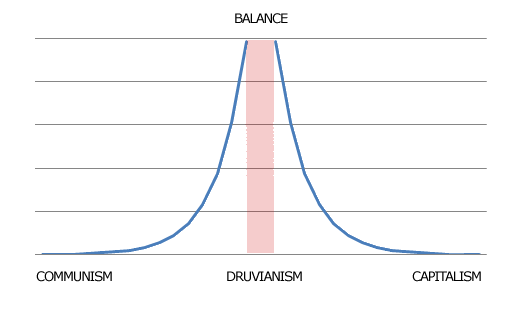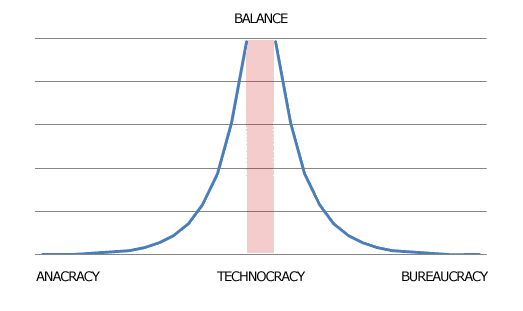Throughout the annals of human history, man has seen fit the necessities of government. For certainly there would be no governments if man were to be perfect. Such governments have and will continue to form under two methods of prioritization and two methods of management. It is, however, the prioritization of society that I find to be more peculiar.
The standard perspective of these prioritizations comprises two categories: Communism and Capitalism. The former prioritizes the society over the individual and the latter prioritizes the individual over society. It is by my own belief that I have come to theorize a third; one where the individual is equal to the society.
Certainly so perfect a balance would be nearly impossible to achieve in any human society. Despite this fact, the goal of perfection is one that continues to inspire and influence societies for years to come. A free society does not maintain perfect Liberty; it merely strives to obtain such a state. It is not then by our predecessor's ignorance of this struggle that we become blind to this third state.
Such a balance would be short lived and would be, in essence, insignificant to the society. I believe such a balance to be so impossible that if it were to be achieved the society would certainly either favor capitalism or communism shortly thereafter-even if only by negligible amounts. It is for this reason that we might become unaware of this perfection.
This concept of Balance is so unobtainable that it would most definitely rely on the constant efforts of citizens just to preserve the aspiration of such a dream. The same is true of other impossible concepts, such as Liberty, Compromise, Representation, and Efficiency. These results may never be perfect, but the constant effort of perfection is what maintains virtue in any free society. This third method of prioritization I call Druvianism.

This third state exists as well in the methods of management. Control and Lack of Control are the two methods of management that have been typically understood by societies. I propose that these two methods are in fact based off of two assumptions: control signifies manual management, whereas lack of control signifies automated management; the former relying on human involvement in the form of a Bureaucracy and the latter relying on a lack of human involvement in the form of an Anacracy.
The third state might exist between the two, such that a perfect balance of manual and automated government has been achieved. It is by my understanding that this proposed state would rely on a Technocracy. Wherein a Bureaucracy relies on humans and an Anacracy relies on a lack of humans, a Technocracy would rely on technology to partially replace human involvement-in such a manner that human involvement may be perfectly balanced with no human involvement. It is, however, important to note that as before mentioned, such a state of perfect balance is impossible to achieve in human societies-or indeed of significant difficult. Therefore, the Size of the Bureaucracy should relate inversely to the Efficiency of the Technocracy.

Using this model, societies would fluctuate, even if only in part, between order and anarchy. For complete order and total control relies on complete human association; thus reciprocally complete disorder and no control relies on complete human disassociation. It is through this realization that the more a Technocracy approaches a decrease in human involvement, the more such a Technocracy would become increasingly Anacratic.
Consider the chart below:

In this model, one could identify a cross along the central column and row. The closer the ideology is to the center, the more the ideology aligns with the Concepts of Liberty, Compromise, Representation, Efficiency, and Balance. The farther from the center the ideology is, the more distant it becomes to these concepts.
One could conclude then that it is the Concept of Balance that enables societies to embrace Concepts of Liberty, Compromise, Representation and Efficiency. Where if in the course of human events this delicate balance is not a goal of its citizens, these concepts are lost and progress into ruin.
----------
Druvianism